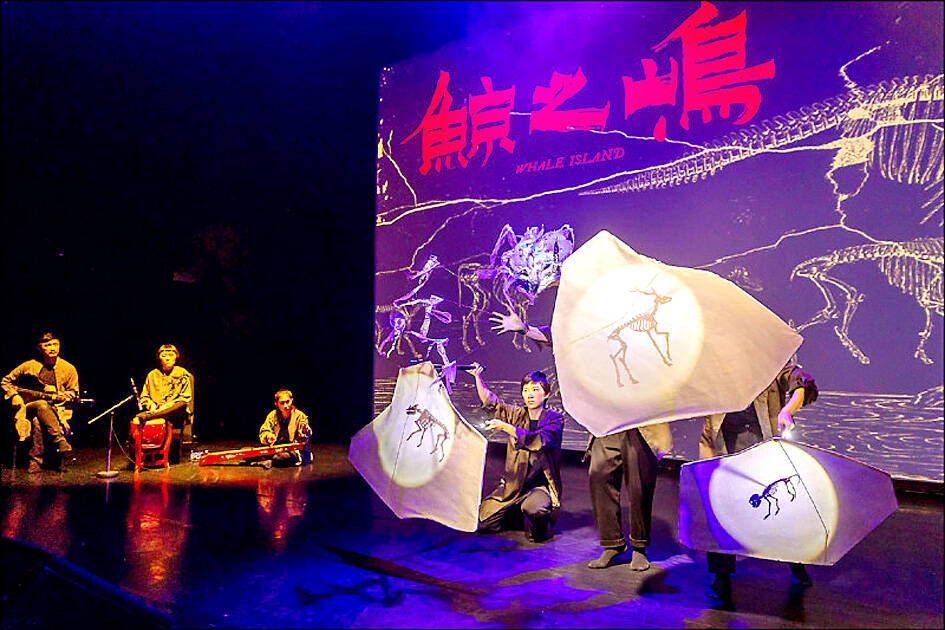Whale Island, a musical based on a mythical story written to encourage people to explore Taiwan’s ancient history, premiered yesterday at the National Theater in Taipei and is showing through the weekend.
It was created by music theater company La Cie MaxMind and puppetry group Puppet & Its Double in collaboration with playwright Shih Ju-fang (施如芳).
It is the third part of a trilogy, with the two groups performing in the first two based on a script written and directed by La Cie MaxMind artistic director Lee Yi-hsiu (李易修), whose vision to create “a mythical epic akin to the Book of Mountains and Seas (山海經)” for Taiwan was backed by the National Performing Arts Center, La Cie MaxMind said in a statement on Thursday.

Photo courtesy of the National Theater & Concert Hall
The first part of the trilogy, The Drought Goddess (大神魃), was first staged in 2008, followed by Isle of Dreams (蓬萊) in 2016. They showcase Lee’s efforts to create contemporary theater works that incorporate traditional nanguan (南管) and beiguan (北管) music, the arts center said in 2021 when it picked Whale Island as its headline production for this year.
The staging of Isle of Dreams in 2018 brought Shih and Lee together after Shih saw the show and found a fellow artist creating original works based on the history of Taiwan, La Cie MaxMind said.
“Ancient people created mythological stories to explain natural phenomena that could not be reasonably explained,” Shih said in the statement, citing her previous lack of understanding of Taiwan’s unique geography and rich history as a reason for her decision to write a mythical story about its history.
In Whale Island, Lee and Shih tell the history of Taiwan from the formation of the island 6 million years ago through characters created from geographical elements, such as ocean currents, a volcano and indigenous creatures such as the Formosan salamander, La Cie MaxMind said.
Puppet & Its Double helps deliver the dramatic effects needed for these characters, who are spirits or deities in the story, it said.
The story Shih wrote is set on a fictional island in a postapocalyptic world, with only one human character — Na Na (娜娜), a girl who is “the sole survivor” of an earthquake and the ensuing tsunami and has only a doll, called Boo Boo (咘咘), to keep her company, it said.
The songs were composed by Hsu Shu-hui (許淑慧), who mixed elements of nanguan and beiguan music with contemporary music, to narrate the story about the once beautiful island, it said.
Thereafter, a character called Kuro, the spirit of the Kuroshio current in the western Pacific, emerges and takes on the role of another narrator.
Whale Island has been three years in the making and was picked by the National Performing Arts Center from among 22 proposed projects in 2021 as the program it would nurture, pour resources into and present this year.
The resources include up to NT$10 million (US$326,360) in funding to create a quality Taiwanese production that can be shown on the global stage after a tour of the National Performing Arts Center’s three venues across the nation.
Following the three performances at the National Theater in Taipei, the National Kaohsiung Center for the Arts is to host two performances on June 17 and 18. Tickets for the performances are available through the Opentix ticketing service.
Two performances are to be staged at National Taichung Theater on Oct. 21 and 22, with tickets yet to go on sale.

An essay competition jointly organized by a local writing society and a publisher affiliated with the Chinese Communist Party (CCP) might have contravened the Act Governing Relations Between the People of the Taiwan Area and the Mainland Area (臺灣地區與大陸地區人民關係條例), the Mainland Affairs Council (MAC) said on Thursday. “In this case, the partner organization is clearly an agency under the CCP’s Fujian Provincial Committee,” MAC Deputy Minister and spokesperson Liang Wen-chieh (梁文傑) said at a news briefing in Taipei. “It also involves bringing Taiwanese students to China with all-expenses-paid arrangements to attend award ceremonies and camps,” Liang said. Those two “characteristics” are typically sufficient

A magnitude 5.9 earthquake that struck about 33km off the coast of Hualien City was the "main shock" in a series of quakes in the area, with aftershocks expected over the next three days, the Central Weather Administration (CWA) said yesterday. Prior to the magnitude 5.9 quake shaking most of Taiwan at 6:53pm yesterday, six other earthquakes stronger than a magnitude of 4, starting with a magnitude 5.5 quake at 6:09pm, occurred in the area. CWA Seismological Center Director Wu Chien-fu (吳健富) confirmed that the quakes were all part of the same series and that the magnitude 5.5 temblor was

The brilliant blue waters, thick foliage and bucolic atmosphere on this seemingly idyllic archipelago deep in the Pacific Ocean belie the key role it now plays in a titanic geopolitical struggle. Palau is again on the front line as China, and the US and its allies prepare their forces in an intensifying contest for control over the Asia-Pacific region. The democratic nation of just 17,000 people hosts US-controlled airstrips and soon-to-be-completed radar installations that the US military describes as “critical” to monitoring vast swathes of water and airspace. It is also a key piece of the second island chain, a string of

The Central Weather Administration has issued a heat alert for southeastern Taiwan, warning of temperatures as high as 36°C today, while alerting some coastal areas of strong winds later in the day. Kaohsiung’s Neimen District (內門) and Pingtung County’s Neipu Township (內埔) are under an orange heat alert, which warns of temperatures as high as 36°C for three consecutive days, the CWA said, citing southwest winds. The heat would also extend to Tainan’s Nansi (楠西) and Yujing (玉井) districts, as well as Pingtung’s Gaoshu (高樹), Yanpu (鹽埔) and Majia (瑪家) townships, it said, forecasting highs of up to 36°C in those areas